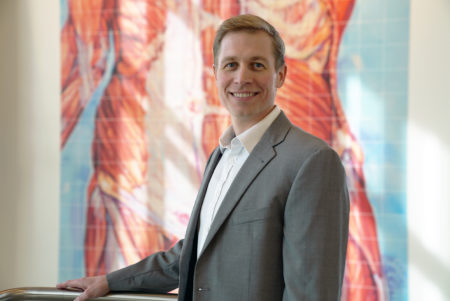 Dr. Dennis C. Rau Jr. serves as Assistant Dean of Osteopathic Integration and Associate Professor of Osteopathic Principles & Practice at the Idaho College of Osteopathic Medicine.
Dr. Dennis C. Rau Jr. serves as Assistant Dean of Osteopathic Integration and Associate Professor of Osteopathic Principles & Practice at the Idaho College of Osteopathic Medicine.
Dr. Rau received his Bachelor of Science (B.S.) degree in Physical Therapy from the University of New England in Biddeford ME in 1998. He later earned his Doctor of Osteopathic Medicine (D.O.) degree from the Kentucky College of Osteopathic Medicine in Pikeville, KY in 2008. In 2009 he completed his general rotating internship at Florida Hospital East in Orlando FL and completed his Neuromuscular Medicine (NMM/OMM) residency at St. Barnabas Hospital in NY.
Prior to coming to ICOM Dr. Rau utilized OMM in private practice treating a variety of neuromuscular complaints and most recently was a professor at William Carey University College of Osteopathic Medicine. His professional interests include visceral and cranial manipulation and he has extensive training in these areas.
Q: What inspired you to pursue a career in medicine?
A: I got into medicine after my work as a physical therapist and being around orthopedic surgeons and physiatrists. At this time I also started to learning manipulation from a fellow PT and an osteopathic physician. As I learned more about the DO training I decided to attend osteopathic medical school myself.
Q: How did you transition into academia, and what inspired you to work for ICOM?
A: I transitioned into medical education after joining a number of my colleagues teaching at William Carey University College of Osteopathic Medicine. I was interested in passing on the manipulative skills to another generation of physicians. I was also interested in spending time around like-minded clinicians and to improve my own skills and understanding of osteopathic practices. The academic environment is great for reviewing anatomy and continuing to perfect basic techniques and to learn from the questions of your students. I was inspired to work at ICOM because I had some ideas about how the teaching of OPP could be done more effectively and efficiently. ICOM’s investment in facilities and technology has allowed me to carry through on a number of these ideas and I have had the pleasure of overseeing the development of a number of very interested, highly motivated and highly skilled students that will help to make osteopathic manipulation a part of the standard of care in our five-state region.
Q: What is your favorite memory from your time in medical school?
A: My favorite memory from medical school is from my time as a second-year student. I attended the KY-COM specifically to learn from a particular professor, Dr. Edward Stiles. To my dismay, Dr. Stiles stepped down as the OPP department chair in my second year. This came with a silver lining however in the form of small group, semi-private teaching sessions with Dr. Stiles outside of the school’s official curriculum. These sessions involved only the most dedicated of students and would take place in the OPP lab in the evenings after classes had ended. It was a wonderful experience to be able to take advantage of both for learning the techniques but also for getting to know my classmates and my mentor as well. I still remember some of the pearls and patient success stories that he passed along to us as we learned many techniques that are no longer taught in osteopathic medical school today.
Q: What is the best part of your job?
A: The best part of my job is seeing students’ faces light up as they begin to feel sensations and have palpatory experiences that they have never felt before. Most of us do not realize how sensitive the hands can be and how much help they can be to patients when properly trained.
Q: What advice do you have for ICOM’s student doctors as they prepare to become physicians?
A: My advice to ICOM students is to remain humble and always continue to improve their tactile perception. In doing so, ICOM students will have a great rapport with their patients and will be able to perform a very thorough physical exam and then utilize their palpation skills to address dysfunction in the neuromuscular system to improve their patients’ lives.